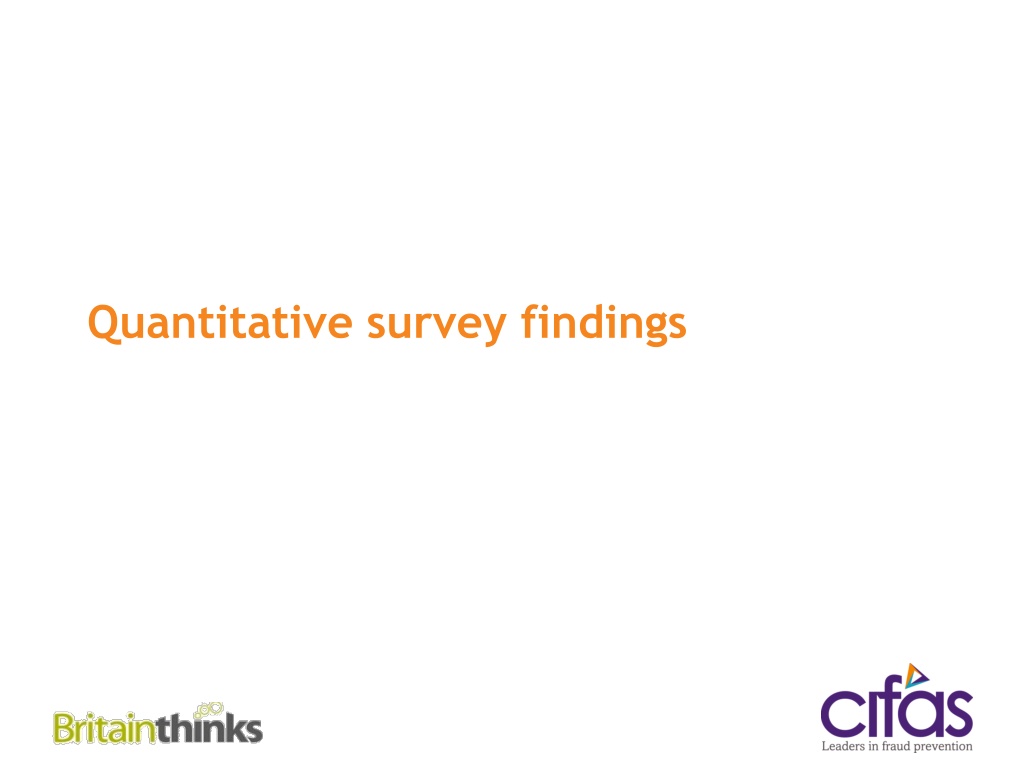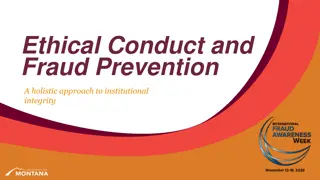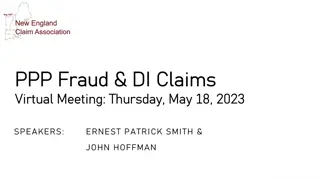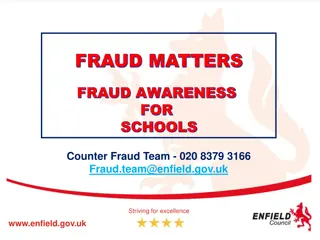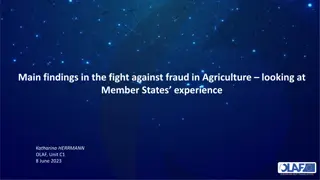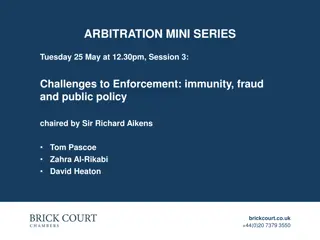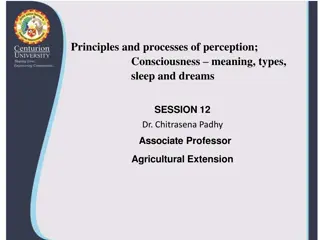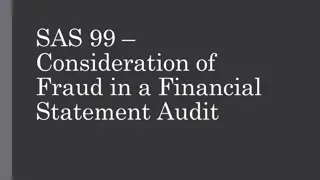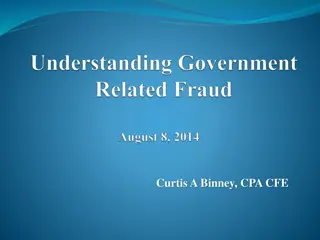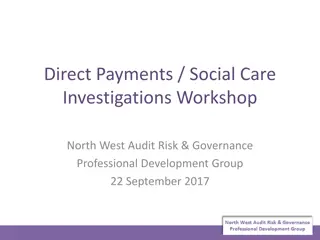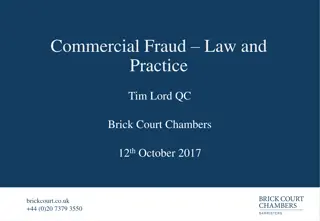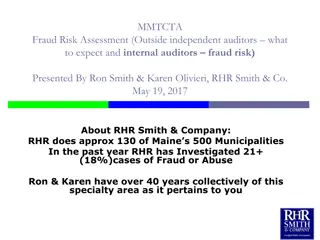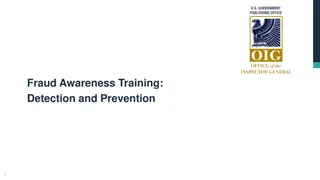Insights from Quantitative Survey Findings on Young People's Perception of Online Fraud
The nationally representative survey reveals that young individuals, particularly those aged 18-24, are more confident in avoiding online fraud compared to the general population. They believe online fraud is unlikely to happen to them and are less concerned about the security of their personal information online. The findings also indicate that young people are less inclined to install anti-virus software on their mobile phones and have a lower awareness of online security compared to the overall public. Reasons for their confidence include feeling financially less attractive to criminals and confident in identifying scams online.
Download Presentation

Please find below an Image/Link to download the presentation.
The content on the website is provided AS IS for your information and personal use only. It may not be sold, licensed, or shared on other websites without obtaining consent from the author. Download presentation by click this link. If you encounter any issues during the download, it is possible that the publisher has removed the file from their server.
E N D
Presentation Transcript
Summary The nationally representative survey results show that young people are more likely to say that online fraud would never happen to them than the national average And, in line with this, half of 18-24 year olds say that they would never fall for an online scam This age group is also less likely than the population as a whole to say they think about how secure their personal details are online And they are less likely to install anti-virus software on their mobile phone Just under a quarter of the public think that young people are particularly at risk A third of 18-24 year olds say they learnt about online security when they were at school And this is lowered to just 8% of the public as a whole
Young people are more likely to say that online fraud would never happen to them than the national average I don t think that online fraud would happen to me Agree strongly Agree Neither agree nor disagree Disagree Disagree strongly Don't know 2% 10% 29% 32% 21% 6% 11% 54% 15% 14% 22% Of ABs agree (versus 12% C1, 8% C2 and 9% DE respondents) Of men agree (versus 9% of women) Of 18-24 year olds agree As we heard in the focus groups, there are a variety of reasons why young people feel they are not at risk of fraud: They have a lack of wealth compared to older age groups, so feel they are unlikely to be targeted by criminals The feel they would be savvy enough to spot a scam Q: How far do you agree or disagree with the following statements? I don t think that online fraud would happen to me. Base: All respondents (n=2000)
In line with this, half of 18-24 year olds say they would never fall for an online scam I would never fall for an online scam Agree strongly Agree Neither agree nor disagree Disagree Disagree strongly Don't know 9% 28% 32% 15% 4% 11% 37% 20% Young people feel confident using the internet and, as we heard in the groups, often the only examples of online fraud that they have heard of seem to be obvious 50% Of 18-24 year olds say they would never fall for an online scam Q: How far do you agree or disagree with the following statements? I would never fall for an online scam. Base: All respondents (n=2000)
Young people are less likely than the population as a whole to say they think about how secure their personal details are online I never think about how secure my personal details are online Agree strongly Agree Neither agree nor disagree Disagree Disagree strongly Don't know 1% 9% 16% 38% 35% 1% 10% 73% As we heard in the focus groups, internet security rarely tends to be a consideration for young people And when they do think about this, it tends to be about the dangers of not knowing who you are speaking to on social media and forums 57% Of 18-24 year olds say they think about how secure their personal details are online Q: How far do you agree or disagree with the following statements? I never think about how secure my personal details are online. Base: All respondents (n=2000)
Over half the population say they are confident that they know how to keep their personal details safe online I feel confident that I know how to keep my personal details safe online Agree strongly Agree Neither agree nor disagree Disagree Disagree strongly Don't know 10% 48% 29% 10% 2% 2% 57% 12% 61% 62% 58% Of men agree (versus 54% of women) Of ABs agree (versus 55% of C1, 56% C2 and 56% DE respondents) Of 18-24 year olds agree As we heard in the focus groups, people feel that they know how to protect themselves online, but that doesn t mean that they are actually doing so For example, many of the young people we spoke to were aware of the need to use complicated passwords, but chose not to because they found them too hard to remember Q: How far do you agree or disagree with the following statements? I feel confident that I know how to keep my personal details safe online. Base: All respondents (n=2000)
Just under a quarter of the public think that young people are particularly at risk Criminals committing identity fraud often target young people Agree strongly Agree Neither agree nor disagree Disagree Disagree strongly Don't know 5% 17% 34% 19% 9% 16% 23% 28% This is in line with what we heard in the focus groups, whereby participants assumed that wealthier or older people would be more likely to be targeted These groups were seen as having more to lose than young people, and there was an assumption that older people in particular would have less experience in using the internet, and perhaps less likely to know how to protect themselves 24% Of 18-24 year olds feel that criminals committing identity fraud often target young people Q: How far do you agree or disagree with the following statements? Criminals committing identity fraud often target young people. Base: All respondents (n=2000)
Over half of the public say they worry about using public wi-fi for online banking and shopping I worry about using public wi-fi for online shopping and banking Agree strongly Agree Neither agree nor disagree Disagree Disagree strongly Don't know 26% 31% 22% 13% 5% 3% 18% 57% 55% Of 18-24 year olds agree Despite this, it is worth remembering the lack of awareness about this danger amongst focus group participants As well as the assumption that using public wi-fi belonging well-known brands will be safe 61% Of women agree (versus 53% of men) Q: How far do you agree or disagree with the following statements? I worry about using public wi-fi for online shopping and banking. Base: All respondents (n=2000)
Young people are less likely to install anti-virus software on their mobile phones than the average for the public as a whole I always install anti-virus software on my mobile phone Agree strongly Agree Neither agree nor disagree Disagree Disagree strongly Don't know 18% 19% 20% 23% 14% 6% 37% 37% As we saw in the focus groups with younger people, awareness of the availability of anti- virus software for smartphones is very low, with most assuming that they are protected already This assumption was particularly strong for Apple devices and phones 27% Of 18-24 year olds say they always install anti-virus software on their mobile phones Q: How far do you agree or disagree with the following statements? I always install anti-virus software on my mobile phone. Base: All respondents (n=2000)
A third of 18-24 year olds say they learnt about online security when they were at school I learnt about online security when I was at school Agree strongly Agree Neither agree nor disagree Disagree Disagree strongly Don't know 2% 6% 6% 20% 63% 2% 8% 83% 34% However, as we heard in the qualitative research, this education is likely to have covered the dangers of not knowing who you are talking to online and cyber bullying, and not issues relating to fraud Of 18-24 year say they learnt about online security when they were at school Q: How far do you agree or disagree with the following statements? I learnt about online security when I was at school. Base: All respondents (n=2000)
